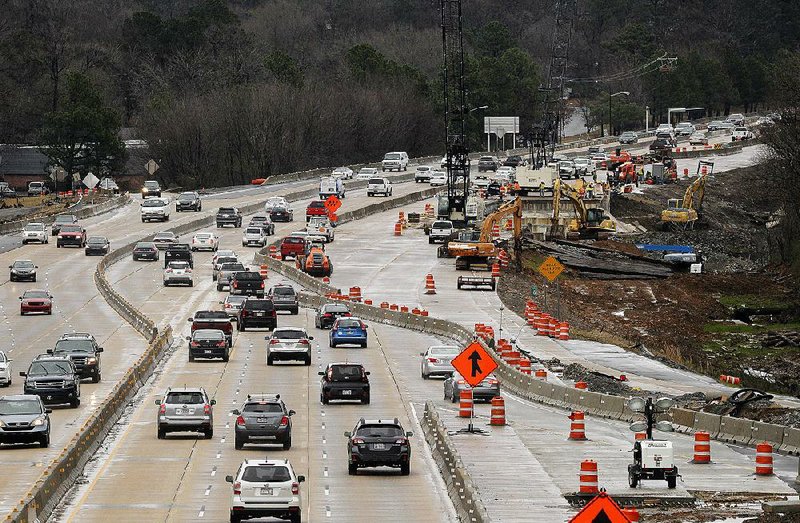A circuit judge on Friday rejected a request for a preliminary injunction that state highway officials said would have immediately halted work on an ongoing construction project on Interstate 630 and a planned job on Interstate 30.
The request came in a lawsuit that said a "plain reading" of Amendment 91, which governs much of the money spent on those and other projects in the $1.8 billion Connecting Arkansas program, limits the funding of improvements to four-lane highways or two-lane highways being widened to four lanes.
A 2.2-mile section of I-630 is being widened to eight lanes from four in an $87.4 million project that began last summer and is scheduled to be completed early next year.
The I-30 project is $631.7 million worth of work to improve a 6.7-mile section through downtown Little Rock and North Little Rock, including replacement of the Arkansas River bridge. It is scheduled to begin construction early next year.
Both projects use significant monies from the Connecting Arkansas Program, which focuses work on regionally significant projects around the state. It is financed in large part by a half-percent sales tax contained in Amendment 91, which voters approved in 2012. The tax is in place for 10 years.
Justin Zachary of Conway, the lead attorney in the lawsuit, said the plaintiffs wanted to see work on both projects continue, just not with the Amendment 91 monies.
But Scott Bennett, director of the Arkansas Department of Transportation, said neither project could have proceeded without that money.
The amendment language defines "four-lane highway improvements" to include "four-lane roadways, bridges, tunnels, engineering, rights of way and other related capital improvements and facilities appurtenant or pertaining thereto, including costs of rights-of-way acquisition and utility adjustments."
The language also includes "the maintenance of four-lane highway improvements constructed with proceeds of the bond" within the definition of "four-lane highway improvements."
The amendment contains other references to four-lane highways, including that the bonds issued as part of the program are payable from the Arkansas Four-Lane Highway Construction and Improvement Bond Account.
Gray's ruling turned on language the plaintiffs used in an amended complaint in which they focused their lawsuits on projects exceeding four "travel lanes."
In a hearing last week and post-hearing proposed findings of fact and conclusions of law, the department's chief counsel, Rita Looney, had argued the language of Amendment 91 was "ambiguous" and cited the plaintiff's reference to travel lanes in their amended lawsuit.
"The term 'travel' lanes is not language found in the amendment," Looney wrote. "This change indicates, even to plaintiffs, the language of Amendment 91 is ambiguous."
Gray agreed.
"As currently pled in the amended complaint, plaintiffs' claims do not properly address the text of Amendment 91," the judge wrote in her two-page order. "As plaintiffs' claims are currently stated in their amended complaint, the court cannot find that Plaintiffs have established a reasonable probability of success on the merits."
Gray set a final hearing on the lawsuit for 9:30 a.m. April 4.
Reaction from both sides was muted Friday afternoon.
"We are pleased with the Court's ruling," said Keli Wylie, the department's administrator for the Connecting Arkansas Program.
Attorney General Leslie Rutledge's office expressed identical sentiments. The office represented Gov. Asa Hutchinson and other elected officials who were named as defendants.
"The attorney general is pleased with the Circuit Court's decision denying the preliminary injunction," spokesman Amanda Priest said in an email.
A statement from Zachary also was brief.
"We respect the judge's decision and we look forward to the final hearing on the Fourth of April," he said.
Zachary's clients include Shelley Buonauito and Sara B. Thompson, both of Fayetteville; Mary Weeks of Little Rock; and Verlon Abram of the Cleburne County community of Wilburn. The lead plaintiff, Richard Mason of El Dorado, withdrew.
The lawsuit is the second involving the I-630 project.
Last July, U.S. District Judge James Moody denied an attempt by a group of Little Rock residents to halt the project on the west side of the city.
Moody said the plaintiffs failed to establish that the project would "have a significant environmental impact" and didn't show a "substantial probability of success" to establish that the decision by state and federal transportation officials to forgo more in-depth environmental reviews of the project was "arbitrary, capricious, an abuse of discretion, or otherwise in violation of the law."
The residents sued the state Transportation Department and the Federal Highway Administration, a U.S. Department of Transportation agency. They said the agencies wrongly classified the project as a "Categorical Exclusion," which doesn't require the work needed more rigorous environmental analysis, including its impact on air quality.
State highway officials say the project will help accommodate future traffic demand, which they estimate at 138,000 vehicles daily by 2037. More than 100,000 vehicles per day travel the section now.
The increased traffic will increase pollutants from emissions, endangering the health of residents living along the section, particularly children, according to the lawsuit.
"The Court further finds that there will be little, if any, irreparable harm to the plaintiffs or the public by allowing the I-630 project to continue while the litigation of the case proceeds," Moody said in July. "Plaintiffs' evidence regarding irreparable harm focused on air quality caused by the increased traffic on I-630 following the completion of the project."
Moody's ruling is on appeal.
Metro on 03/02/2019
